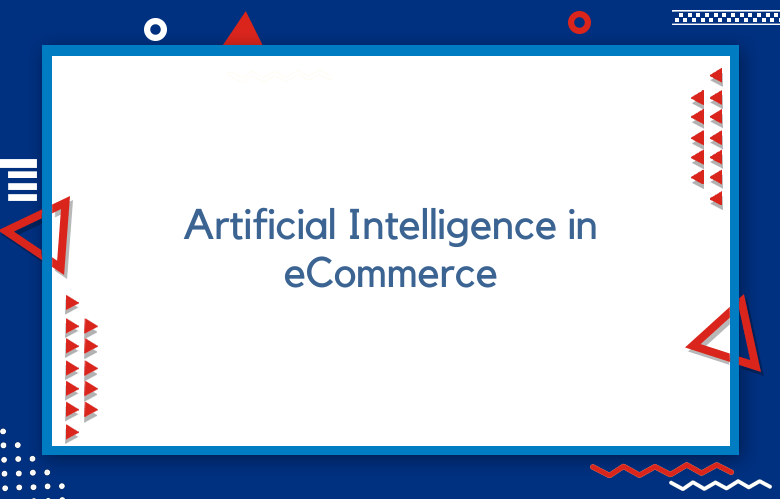The Role of Artificial Intelligence in eCommerce

The world of e-commerce is constantly evolving as new technologies emerge that make it easier than ever to buy and sell goods online. One of the biggest game-changers in recent years has been the rise of Artificial Intelligence (AI). AI has revolutionized how we interact with e-commerce platforms, from personalized product recommendations to automated customer service chatbots. Let’s dive into the role Artificial Intelligence in eCommerce today.
Leveraging Artificial Intelligence for E-Commerce Success
As technology advances, businesses increasingly rely on artificial intelligence (AI) to improve their customer experience and gain a competitive advantage in the e-commerce marketplace.
AI can automate a task that would otherwise require manual labor, allowing businesses to achieve greater efficiency while providing customers with more personalized service. Let’s explore the role of AI in e-commerce and how it can help companies to succeed.
Product Recommendations
One of the most common uses for AI in e-commerce is product recommendations.
Through machine learning algorithms, e-commerce sites can analyze a customer’s purchasing history and make tailored suggestions based on their past purchases.
This allows customers to easily find new products they may be interested in buying, leading to higher conversion rates and more satisfied customers.
Payment Processing
Another area where AI is making a significant impact on e-commerce is payment processing.
AI algorithms are used to process payments quickly and accurately without human intervention.
This helps eliminate errors and fraud while speeding up transactions so customers get their products faster.
Some companies are using AI to offer custom pricing options based on individual customer needs or preferences, allowing them to provide discounts or other incentives that will help increase sales and build loyalty among their customers.
Customer Service Chatbots
AI is also being used for automated customer service chatbots. The chatbots use natural language processing (NLP) technology to understand customer inquiries and respond appropriately with answers or solutions to common problems.
This saves time for businesses and customers as it eliminates the need for manual customer service inquiries or waiting on hold for long periods while trying to get help from a company representative.
Many customers now prefer interacting with chatbots since they can usually get an answer more quickly than if they were dealing with a human representative directly!
The Role of Artificial Intelligence
Artificial intelligence (AI) is increasingly becoming critical in today’s digital age businesses.
As technology advances and evolves, AI has become an integral part of many industries, and e-commerce is no exception.
AI provides e-commerce businesses with a variety of advantages when it comes to customer engagement, marketing, and operations. Let’s explore the role AI plays in e-commerce.
The Impact of Artificial Intelligence
We live in an age of technology and automation, where artificial intelligence (AI) plays an increasingly important role in our everyday lives.
AI has become a significant contributor to the growth of e-commerce, allowing businesses to automate processes, improve customer service, and increase sales.
Let’s take a look at how AI is revolutionizing the e-commerce industry.
Improving Customer Service
A key benefit of using AI in e-commerce is its ability to provide better customer service.
By leveraging machine learning algorithms, a business can quickly analyze customer data and provide personalized customer recommendations based on past purchases or interests.
AI chatbots are growing more popular as they allow companies to offer 24/7 customer support without human intervention.
This helps create a better customer experience, leading to higher customer satisfaction and loyalty.
Increasing Sales
AI can also increase sales by helping companies identify new opportunities and trends in the market faster than ever before.
By analyzing customer behavior patterns and utilizing predictive analytics, businesses can gain insights into what products customers are likely to buy in the future, which allows them to adjust their offerings accordingly.
AI can help companies optimize pricing strategies to maximize profits while offering competitive prices for their products or services.
Personalized Shopping Experiences
One of the primary benefits of using AI for e-commerce is that it allows businesses to offer customers personalized shopping experiences.
For example, companies can use AI algorithms to analyze customer data, such as browsing habits and purchase history, to create tailored product recommendations for each shopper.
This makes the online shopping experience more enjoyable for customers and increases the likelihood that they will make a purchase.
AI also enables more accurate product search capabilities by allowing shoppers to search for products based on specific criteria such as color or size rather than just keywords.
This helps them quickly find what they are searching for without sifting through pages of irrelevant results.
Furthermore, AI can be used by e-commerce sites to provide customers with real-time assistance during their online shopping journey by answering any questions they may have about products or services.
Marketing Automation
Another way that AI can be used in e-commerce is through marketing automation. With the help of AI algorithms, a business can automate marketing tasks like email campaigns and social media posts.
This saves time and allows companies to target their messages more effectively since they can use customer data, such as demographics and preferences, to tailor their messaging accordingly.
Some tools like chatbots enable customers to interact with a business’s website directly to get answers to questions or make purchases without ever having to leave the site.
Operational Efficiency
AI can be used by e-commerce businesses to streamline their operations and increase efficiency.
For instance, AI algorithms can be used for inventory management by automatically tracking sales data and determining when products need to be reordered or replenished before stock runs out.
It can also help with fraud detection by monitoring customer transactions for suspicious activity and flagging potential threats before they become an issue for the business or its customers.
Security Measures
The main advantage of using AI for e-commerce is improved security measures.
Artificial intelligence systems can quickly and accurately detect suspicious activity online, such as unusual login attempts or fraudulent transactions, reducing the risk of cyber-attacks and identity theft.
AI can monitor customer accounts for any changes in behavior that may indicate fraud or malicious intent. This helps protect businesses and their customers from potential harm caused by cybercriminals.
eCommerce Marketing using Artificial Intelligence Consulting
Artificial intelligence is increasingly being used in eCommerce marketing, offering a range of advantages and opportunities. Here are some points to consider when leveraging AI to drive e-commerce marketing campaigns:
Leveraging AI to Personalize the Customer Experience
AI can provide customers with tailor-made experiences that meet their individual needs and preferences. By analyzing customer data, AI algorithms can gain valuable insights about customers’ behavior and interests, enabling businesses to create more targeted and personalized campaigns with more significant potential for success.
Automating Marketing Tasks
AI can help automate many mundane tasks associated with running an eCommerce store, such as sending out automated emails or optimizing website content based on customer feedback. It frees human resources from manual labor so they can be allocated toward more strategic tasks, helping improve the overall efficiency and productivity of a business’s digital marketing strategy.
Improving SEO Performance
AI-driven tools can generate valuable insights about consumer search patterns, track how users interact with websites, and provide real-time analytics around SEO performance. This data can be used to adjust website content or target specific keywords to optimize search engine results and improve online visibility.
Automating Content Creation
Content creation is integral to any digital marketing strategy, but it’s also incredibly time-consuming. Artificial intelligence technology has made it possible to automate content creation processes by gathering data from multiple sources and using machine learning algorithms to generate high-quality pieces without needing manual intervention.
Enhancing Social Media Management
AI technologies are also being used in social media management, allowing marketers to automatically manage accounts and respond quickly to messages within minutes rather than hours or days, manually checking accounts for activity and replying accordingly.
Conclusion
As you can see, artificial intelligence is increasingly important in e-commerce today.
From product recommendations to payment processing and customer service chatbots, AI has become integral to companies’ online businesses.
With its ability to automate tedious tasks and improve efficiency across multiple areas, it’s no wonder why so many companies are turning to AI for help with their e-commerce operations!
Call: +91 9848321284
Email: [email protected]



